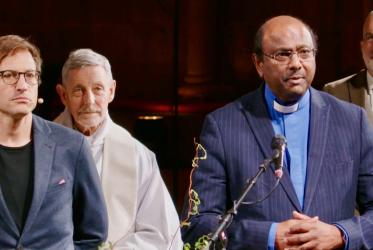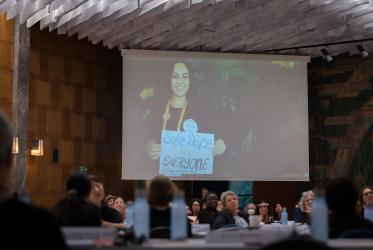A High-Level Conference in Geneva of governments, United Nations agencies and civil society organizations, including churches and faith-based organizations, has underlined the need for urgent action to strengthen coordination and cooperation in Europe's response to the refugee and migrant crisis.
The 18-19 January conference was hosted by the World Council of Churches (WCC) and co-sponsored by UNICEF, the UN Children's Fund; UNFPA, the UN Population Fund; and UNHCR, the office of the UN High Commissioner for Refugees.
The conference focussed on commitments to strengthen coordinated responses to the crisis, including the implementation of migration and integration policies, and the creation of adequate mechanisms for orderly and safe refugee and migrant movements across Europe.
While the majority of refugees and migrants have fled countries gripped by conflict, violence, persecution and hardship, the responses of European governments have varied from compassionate and generous hospitality, to resumption of border controls, pushback, and the raising of fences.
The Rev. Dr Olav Fykse Tveit, WCC general secretary, said: "The European countries and people must live up to their humanitarian values and standards reflected in commitments to international conventions. This must be evident in a crisis for so many refugees that are coming to Europe or who are already in Europe.”
He continued, "To be human is to have the ability to hope. Faith in God is a hope that the present reality can change to something better, change through actions of love. The refugees themselves need that we provide them signs of hope."
Marie-Pierre Poirier, UNICEF Special Coordinator for the Refugee and Migrant Crisis in Europe, said: “The refugee and migrant crisis in Europe is a children's crisis. Of the 1 million people who crossed the Mediterranean last year, more than one in four was a child; since September, in southeastern Europe, this proportion has risen to one in three. Faith-based organizations are critical partners to governments and to UN agencies, such as UNICEF, in the response to the crisis in countries of origin, countries where people are on the move, and countries of destination. We must protect children as they arrive in Europe, working together to make our societies inclusive. This call to action for shared responsibility and coordinated action is both timely and essential."
Janice Lyn Marshall, Deputy Director of Policy and Law in the division of international protection at UNHCR Geneva, said: "The conference aimed to promote principled, human rights-based and coordinated responses to refugees in Europe and to the root causes of their displacement. In this spirit, we welcome the efforts and the outcome of this conference in contributing to the work in that direction."
Alphonso Barragues, Human Rights Advisor, UNFPA, said: "UNFPA has an important role in this discussion, which is to give a voice to vulnerable woman and adolescent girls, who are powerless and who suffer from the refugee crisis in a particular way. Faith-based organizations are in a unique place to challenge social norms and discriminatory attitudes. Therefore, this is a natural partnership for us."
During the conference, representatives of governments, UN agencies and civil society partners, including churches and faith-based organizations, offered facts, figures, and testimonies from their own experience and perspective on the refugee and migrant crisis - in the countries of origin, transit and reception.
In a keynote address to the conference, Dr Thomas de Maizière, Minister of the Interior of the Federal Republic of Germany, underlined that managing the global refugee crisis is not the task of government policy-makers alone, nor only the task for the governments in the European countries receiving refugees and migrants.
He stated: "The extraordinary political, social and humanitarian challenges raised by the refugee crisis show that government, civil society, business and also churches have a shared responsibility."
A final statement from the conference will be issued on 20 January.
German interior minister underlines churches' role in refugee response (WCC press release of 18 January)
Photos of the conference and of refugees in various European countries are available free of charge at photos.oikoumene.org
Video recordings of the keynote by the German interior minister and other sessions are available on the WCC YouTube channel.
More information on WCC work on migration (including conference documentation)





